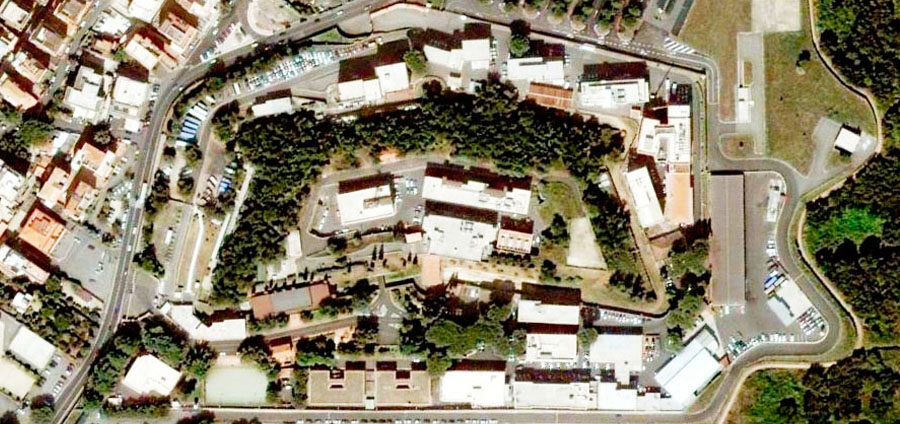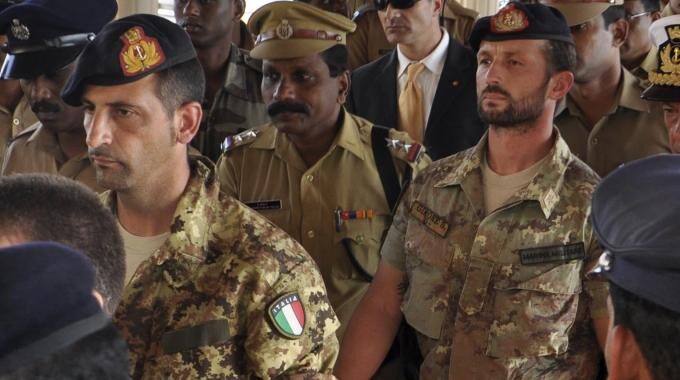
Forte Braschi, headquarters of the A.I.S.E.
The credibility of any Information Service dedicated to the gathering of intelligence abroad, as is the Italian Agency for Information and External Security (A.I.S.E.), is both linked to the efficiency of its operational capacity and to the bilateral/multilateral relationships it is able to produce in the cooperation with its foreign counterparts. Ours is a globalized world where events and situations intertwine without territorial boundaries, where the parameters through which national security objectives can be attained have become more difficult to identify, where it is not possible to know everything quickly and accurately anymore, where causes and effects are often unforeseeable and correlate in ridiculous time spans, where information has immediately a global dimension. It is in such a scenario that trustworthy relationships with foreign Services have become a crucial means for getting to know both the deeds and the misdeeds. Such a requirement is obviously felt more by those intelligence organisms that work with limited financial and human resources and within a regional geo-strategic context as is the case of the A.I.S.E.. The Service would not be capable of facing information requests regarding areas outside its operational reach abroad without a collaboration with foreign Services. In the intelligence world there are no love marriages, but only marriages of interest. No free lunches. The sovereign rule is “do ut des” and hence, if you want to receive information, you have to be able to provide information in exchange, seldom in other sectors or areas. In fact, this is the “commercial” side of intelligence cooperation. Furthermore, the availability to give information is directly proportional to the trust a Service has in its counterpart. No trust, no information. And this goes along with the concept of credibility. Let us analyze the case of Franco Lamolinara. 
Christopher McManus and Franco Lamolinara
THE DEATH OF FRANCO LAMOLINARA
Civil engineer Franco Lamolinara was kidnapped along with a British citizen, Christopher McManus, on May 12th 2011 in Birkin Kebin in Nigeria. On March 8th 2012 the Nigerian and British special forces attempted a raid to free the hostages. During the operation both hostages were killed. The Italian authorities, intelligence services included, were not informed. British Prime Minister David Cameron called the Italian PM Mario Monti once the raid had already started. It is fair enough to wonder why the operation took place without a previous consultation or communication with Italy. Both the United Kingdom and Nigeria are concerned. Such a question is of tantamount relevance if we consider that an A.I.S.E. representative is based in Abuja and a couple of his colleagues are in London. Plus there is a British intelligence representative in Rome. It wasn’t a communication problem, but rather a precise willingness not to inform the Italians about the imminent operation. As for the British, be they MI-5 or MI-6, they have hardly ever interfaced with other Services if not with the Americans (with whom they cooperate in symbiosis) or other intelligence agencies from their former colonies (with whom they safeguard a preferential track). The nature of this relationship could have led the Nigerians to keep quiet about the oncoming military operation. Be it as it may, unmistakeable signals were out there waiting to be interpreted. One of them was the landing in Nigeria of a team of British Special Forces. It was easy to deduce, but this wasn’t the case, that a military operation was on its way. Being on Nigerian ground would have meant that the local security forces were also part of it. An attentive bureau chief with some experience and intuition would have surely gathered some information on the issue. Not from the British, but from the Nigerians through a combination of shrewdness and targeted presents. The fall of credibility of the A.I.S.E. was determined by both lack of skill and on an undeniable truth in international affairs: in the case of kidnappings Italy will always prefer negotiations, the outcome of which is surely enough the payment of a ransom. Had Italian authorities known about the military operation through official channels, they would have surely denied their consent. This has been the case in Iraq, Afghanistan and in other similar situations in Africa. Such a modus operandi is not greatly appreciated, especially by the Americans and the British, nor by those countries facing endogenous terrorism such as Algeria or Mauritania. Surrendering to blackmail will increase the probability of getting your hostage released unharmed. The downside is that by paying a ransom you are feeding a criminal and/or terrorist organization thereby bearing out that any blackmail will pay in the long run. In this specific case the ransom would have gone to the Boko Haram extremists. And in that specific market Italy is by now rated as a good client.
OTHER RECENT DEBACLES
An Agency report was requested on the situation in the Maldives. Reply: everything is ok. Two days later there comes a coup d’etat. The geographical area is not among the Agency’s priorities, nor is it continuously monitored. A typical example of influence peddling combined with unskillfulness. Last March two Italian marines are put under arrest in Cochin (and are currently detained) for shooting at a presumed pirate ship in the Indian Ocean, while two other Italians are kidnapped in Orissa State, India. Between these two events the Agency’s bureau chief in New Delhi retired and was not replaced. His retirement was due to old age, thus chronologically foreseeable. The bureau was left vacant because his replacement was still undergoing training. No one was hence present to open talks with the local Services on a constant and continuous basis as circumstances required. Not so much for the two Italian soldiers, whose case is being handled by the Italian Ministry of Foreign Affairs, but definitely for the hostages. Even in the latter case the Ministry of Foreign Affairs has to be given credit for the liberation of Paolo Bosusco on April 12th. The Agency, if not for last minute efforts, was largely inactive. Italian Prime Minister Mario Monti lands in Libya for his first visit on January 21st 2012. He asks the Agency for information on the situation on the ground. Reply: everything is calm. Monti arrives in Tripoli and hotel is taken under siege iwhile clashes erupt all over town. This happened because during the Arab Spring in Libya the newly designated bureau chief had been recalled home and forced to retire following new recruitment rules set out by the Agency. The bureau chief was justifiably furious. 
The two Italian “navy seals” detained in India
CREBIDILITY AND THE EMPLOYMENT OF PERSONNEL
Most of the above described situations derive from the inadequate employment of personnel and the lack of professionalism of the latter when it is appointed abroad. A bureau chief’s day to day activity abroad spans from espionage to anti-terrorism. It is based on the quality of the relationships with local security agencies, on the continuous analysis of events and on the capability of establishing relationships with the surrounding world, be it the Italian or international community, keeping in mind that an agent has to act below the radar of local intelligence services. The knowledge base of any agent should allow him to identify informational objectives while keeping the pace with the evolution of the situation on the ground. None of this can be improvised or spring out from a “good word”. This is an atypical job that requires time to be assimilated, training is ongoing and certain characteristics (cultural, linguistic, show of initiative, intuition and deduction, communication skills, perception of danger, psychology as applied to human relationships, power of observation, confidentiality and many more) are not that common at all. In the past, before being employed abroad, anyone aspiring to the post of bureau chief required 2-3 years of experience as an analyst, possibly in the future area of employment (thus gaining specific knowledge on a region that would have enhanced his evaluation skills). After that the agent would transit through the specific operational branch where he would stay for another couple of years in order to strengthen his modus operandi techniques – better said sensibility – through the imitation or contrast of what his colleagues were already doing on the ground. This nucleus of people, whose theoretical and practical training cycle lasted 8-9 years, was employed over time or used in emergency situations. Unfortunately today, maybe more than in the past (as circumstance have become endemic), such excursus ad honorem is largely disregarded. Regretfully in an Agency where the average management period assigned to a Director General lasts from 3 to 5 years, the benefits of time for those who sow and harvest qualified personnel are often thwarted by contingent and surely less professional assessments. With some exceptions, that are not the rule, agents abroad are assigned through good words and recommendations or for personal gratification. This is the case of the Agency’s representative in Abuja, Nigeria. He was a petty officer turned civil servant who had spent his entire professional life doing other things. Without sufficient or specific background, he was assigned abroad at the end of his career to presumably obtain a salary increase. The post was surely obtained through the good offices of his former Chief, now Deputy Executive Director of the Agency, with whom he had previously worked at his unit. And, according to press articles, the officer was probably on vacation during the Lamolinara operation. At the same time, together with a bureau chief in Abuja at the end of his career, we have the presence in London (a very attractive bureau with a high rate of solid recommendations) of a relative of a high ranking official from the Presidency of the Republic and of a young aide of a former Agency Director. Is this why the raid to free Lamolinara took place without the knowledge of the A.I.S.E.? It is hard to confirm, but surely enough these overlapping circumstances have had a negative influence on events and it is beyond doubt that had there been other better qualified officials at their post the situation would have been different. The same can be said about the bureau chief in New Delhi. He was also at the end of his career and placed into retirement without being replaced. Could he have had an impact on the kidnapping of our nationals in Orissa? We will never know.
RECRUITMENT POLICIES
It is quite evident to affirm that throughout the different activities into which the Agency is involved the quality of personnel is a key element. Co-optation has always been the applied employment criteria. Men were drawn from both Armed and Security forces. Over time, this system could have guaranteed, if applied correctly, a wise choice of the members of the Service. Instead it was influenced, better said polluted, by prevailing solid recommendations, political and familial patronage and by a system of favors and cross-interests. This has also been favored by an increase of recruits borne out of the civilian world. The Agency has become the mirror image of today’s Italy. With the only difference that the recruitment to the Service does not come through a competitive examination. You are recruited either from other State departments or, and this is where most abuses come from, through direct calls from the civilian world. The latter is a technique that utilizes State Secret to conceal unethical and illicit behaviors. If to the lack of a competitive process we add a good salary, it is easy to understand how extended and pressing this market has become. Notwithstanding those who have tried to enter the organization through the often publicized – but truly never put into practice – public competitive exam relying on the quality of their curricula. If someone has made it through this process, perhaps due to hard-to-find linguistic skills (and this did rarely happen), they are there to show that the rule has become a rare exception. To this we have to add that careers moves and advancements are all left to the complete discretion of those who rule. The fact is that those who received a solid recommendation to enter the structure were the same people who had better chances of progressing in their career with respect to others. Possibly contravening professional quality assessments. The end result is that, over time, the overall quality of personnel has plunged, thus hampering the operational capacity of the Agency. Recently, to this state of affairs, a new system for the renewal/turn over of personnel based on a mathematical equation and not on a critical assessment of each individual has been introduced: those who in the triennium 2010-2013 will reach 40 years of contributions, exceed 20 years of stay in the Agency and have more than 57 years will be sidelined (that is forced into retirement or, on request, placed elsewhere). Such a crude selection system has led and is leading to the exit from the agency of about 400-600 people whose years of experience and professional background are difficult to replace in such a short period of time, especially in the more technical sectors. Evidently other kinds of evaluations the reasoning of which goes beyond ordinary analytical and logical management have found their place. Maybe they find a justification if we substitute logic with practical objectives. The first one aims at allowing the Agency to replace the organic voids through the recruitment of other people. There is more room, thus the creation of more opportunities in the work market. More room for familism, patronage, claims from politicians and high ranking State officials (to whom we have to add, for the sake of statistics, a plethora of sons/relatives of journalists, magistrates, military etc.). It is not by chance that even a close relative of a Minister of the current technical government has now been satisfied. There is a further collateral effect for the Agency caused by the application of the mathematical equation used for the renewal of personnel: the exclusion of about 800 financial police officers, some of whom have pending judicial issues, who have joined the agency between 2001 and 2006 when Nicolo’ Pollari was at the helm and who do not meet the 20 years of work in the Agency as established by the aforementioned mathematical formula. It could be by chance, but the person responsible for managing personnel is presently the same financial police officer who was nominated by Pollari (and who is by now unremovable because of the merits he has earned and because of the secrets he specifically holds). He is the cornerstone of the patronage system put in place by the then-Director General of the Agency who would have used it to gain the political backing that would allow him to become the first Commander of the Guardia di Finanza (the financial police) chosen from the ranks of the Guardia itself. Such aim waned away after the Pio Pompa and Abu Omar affairs. His links with the then-Commander of the Guardia di Finanza, Roberto Speciale, allowed both of them and their respective agencies to entertain special relationships, with the exchange of personnel between the two organizations and in the reciprocal assistance of the relatives hired thereof.
A VOID TO BE FILLED
This has been a historical period for the Service, now Agency, where the hirings, previously managed in a traditional and aperiodic manner, have become systemic and continuous and finally integral part of a corrupt system based on cohabitations and self-interests. All of this has been unhampered by the so-called renewal. Actually it has been justified even further through the artificial creation of organic spaces. The paradox is that while the aging personnel has been put into retirement, a 65 year old prefect who could not find an adequate position at the Ministry of Interior has been enrolled.
It is not fair to demonize this state of things to reach the conclusion that the current cadres hired in the Agency are all unskilled for the roles and tasks they have to fill. There are still, especially among the old guard, several highly skilled individuals in the Agency. But numerically they are not enough. Some young newly employed agents will probably have the chance in the future, but not today, to become true professionals. But this is not the basis on which they were hired. The problem is the lack of ethics currently ruling over the system and that could produce in the beneficiaries the idea that any objective can be reached regardless of merit. The other issue is the time span between the hiring of personnel and the subsequent acquisition of the professional skills that such a tricky task requires. The current lack of operational capacity within the A.I.S.E. is especially due to the latter.
Tweet
